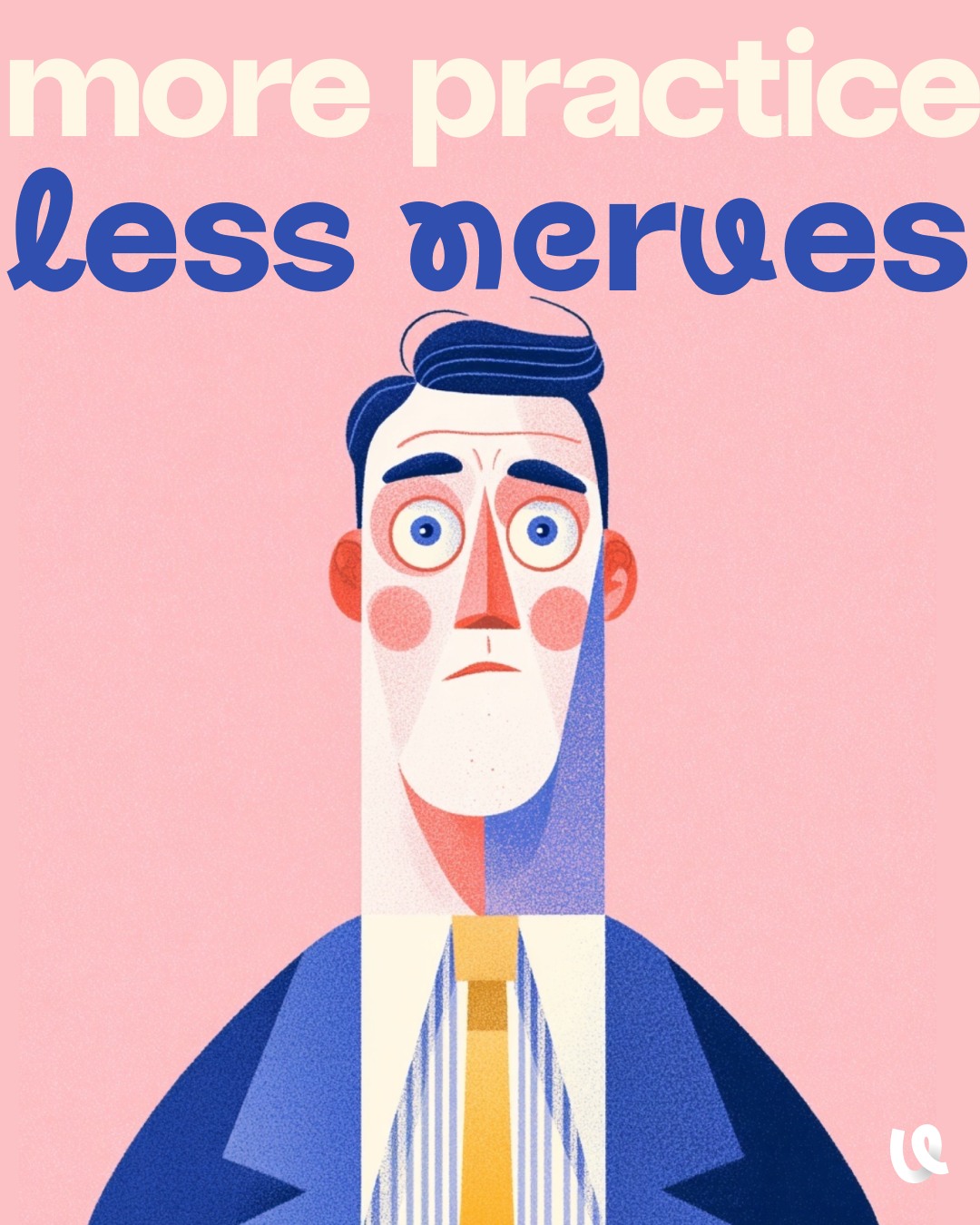Your interview is tomorrow. You can't sleep. Your mind won't stop spinning:
"What if I freeze? What if they ask something I can't answer? What if I say something stupid?"
You know you're qualified. But the anxiety is so overwhelming that you're already imagining failure.
This isn't "just nerves." This is interview anxiety—and it's sabotaging your performance before you even walk in the door.
Why Is Interview Anxiety Different From Regular Nerves?
Regular nervousness: Butterflies in your stomach, slight excitement, manageable energy.
Interview anxiety: Physical symptoms that interfere with your ability to function:
- Racing heart (feels like panic)
- Shallow breathing (can't get enough air)
- Mind going blank (can't access what you know)
- Sweating, shaking, nausea
- Catastrophic thinking ("I'll definitely fail")
- Avoidance behaviors (canceling interviews, over-preparing to the point of exhaustion)
This isn't a mindset problem. It's a physiological stress response that needs practical intervention.
How Does Anxiety Affect Interview Performance?
Some anxiety helps performance. Too much destroys it.
The sweet spot:
- Slightly elevated heart rate → Increased alertness
- Mild tension → Sharper focus
- Anticipation → Motivation to prepare
The danger zone:
- Racing heart → Can't think clearly
- Extreme tension → Physical discomfort that distracts
- Dread → Avoidance and self-sabotage
Your goal isn't to eliminate anxiety. It's to bring it down from the danger zone into the performance zone.
How Does Practice Reduce Interview Anxiety?
The problem: Your brain interprets interviews as threats because they're unfamiliar.
The solution: Make them familiar through repeated exposure.
Why this works:
- Your amygdala (fear center) learns through repetition
- Each safe practice session teaches your brain: "This isn't actually dangerous"
- By the 10th practice interview, your brain stops triggering full panic mode
How to apply it:
- Practice answering questions out loud (not just thinking)
- Do it multiple times (5-10 minimum)
- Simulate real conditions (webcam, timer, standing)
- Notice your anxiety decreasing with each session
Evidence: This is called systematic desensitization in psychology—it's the #1 proven method for reducing anxiety around specific situations.
Practice with structure: Use our Common Interview Questions guide to build confidence through systematic preparation.
Related: Learn more about this in The Amygdala Hijack - Why Your Brain Betrays You
How Do You Use the 4-7-8 Breathing Technique?
The problem: Anxiety triggers shallow breathing, which increases anxiety (vicious cycle).
The solution: Controlled breathing that activates your parasympathetic nervous system.
The technique:
- Breathe in through your nose for 4 counts
- Hold for 7 counts
- Exhale through your mouth for 8 counts
- Repeat 4 times
Why this works:
- Long exhales activate your "rest and digest" system
- Holding your breath interrupts the panic cycle
- Counting gives your mind something to focus on (breaks anxious rumination)
When to use it:
- 10 minutes before the interview
- In the waiting room
- If you feel panic rising during the interview (take a brief pause)
Can You Reframe Anxiety as Excitement?
The problem: Your body's response to anxiety and excitement is nearly identical (elevated heart rate, adrenaline).
The solution: Tell your brain it's excitement, not threat.
The script: Instead of: "I'm so nervous, this is terrible" Say: "I'm excited. My body is getting ready to perform."
Why this works:
- Research by Alison Wood Brooks at Harvard shows that reframing anxiety as excitement improves performance
- You're not denying the physical sensations—you're reinterpreting them
- Excitement = approach state. Anxiety = avoidance state. Your actions follow your interpretation.
Practice this reframe:
- Feel your heart racing? "My body is energized and ready"
- Hands shaking? "Adrenaline is making me sharp"
- Butterflies in stomach? "Excitement about this opportunity"
Does Power Posing Actually Help With Interview Anxiety?
The research: Amy Cuddy's work on power posing shows that body language affects hormones.
The practice:
- 2 minutes before the interview
- Stand with feet wide, hands on hips (or arms raised in victory)
- Hold the pose, breathe deeply
Why this works:
- Increases testosterone (confidence hormone)
- Decreases cortisol (stress hormone)
- Tricks your brain into feeling more powerful
Important: Do this in private (bathroom, car), not during the interview.
What Are Anchoring Statements and How Do They Help?
The problem: Anxious thoughts spiral: "What if I mess up? They'll think I'm incompetent. I'll never get a job."
The solution: Pre-written anchoring statements that interrupt the spiral.
Examples:
- "I've prepared. I know my material."
- "One interview doesn't define my worth."
- "I've succeeded before. I can succeed again."
- "Anxiety is temporary. I can handle this."
How to use them:
- Write 3-5 statements on a card
- Read them before the interview
- When anxiety spikes, repeat one silently
This grounds you back in reality instead of catastrophic imagination.
Stop Guessing. See Exactly How You Sound.
Reading about interviews won't help you. Speaking out loud will.
Get specific feedback on what's working and what's killing your chances. Know your blind spots before the real interview.
How Does Reminding Yourself "I've Done This Before" Help?
The problem: Your brain fears novelty (new = potential danger).
The solution: Remind your brain of similar situations you've handled successfully.
The exercise: Before the interview, write down:
- A time you were nervous but performed well anyway
- A challenging conversation you navigated successfully
- A high-pressure situation you handled
Read this list to remind your brain: "I've handled hard things before. I can handle this too."
This builds evidence-based confidence that counters anxiety.
Related: The Confidence Equation - Why Practice Builds Belief
What Should Your Interview Day Routine Look Like?
The problem: Winging your pre-interview routine adds uncertainty, which increases anxiety.
The solution: A consistent routine that signals to your brain: "We've got this."
Sample routine:
- 2 hours before: Light meal (protein, avoid sugar crash)
- 1 hour before: Review your key stories (don't cram new material)
- 30 min before: Power pose + breathing exercises
- 10 min before: Read your anchoring statements
- 5 min before: Reframe anxiety as excitement
Consistency = familiarity = lower anxiety
Should You Accept Anxiety Instead of Fighting It?
The counterintuitive truth: Trying to eliminate anxiety often makes it worse.
The alternative: Acceptance and Commitment Therapy (ACT) approach
The practice: Instead of "I need to not be anxious" Try: "I'm anxious AND I can still do this"
Why this works:
- Fighting anxiety creates more tension
- Accepting it reduces the secondary anxiety (anxiety about being anxious)
- You can perform while anxious—it's uncomfortable but possible
The mantra: "I'm anxious, and that's okay. Let's do this anyway."
How Do You Recover After an Interview?
The often-ignored piece: Interview anxiety doesn't end when the interview does.
The problem: You'll ruminate: "Why did I say that? They probably hated me."
The solution: Planned recovery activities
Immediately after:
- Take a 15-minute walk (physical movement processes stress hormones)
- Do something completely unrelated (break the rumination cycle)
- Write down 3 things that went well (counter negativity bias)
Don't:
- Replay every "mistake" for hours
- Text friends asking "Do you think they liked me?"
- Start applying to more jobs immediately (process this one first)
When Should You Consider Professional Help for Interview Anxiety?
The honest conversation: Sometimes anxiety is severe enough that self-help strategies aren't sufficient.
Signs you might need professional help:
- Panic attacks about interviews
- Avoiding job searching entirely due to anxiety
- Physical symptoms that interfere with daily life
- Anxiety that doesn't improve with practice
Options:
- Therapy: CBT (Cognitive Behavioral Therapy) is highly effective for anxiety
- Medication: Beta-blockers can reduce physical symptoms (racing heart, shaking)
- Coaching: Professional interview coaching can build confidence faster
This isn't weakness. It's treating a genuine condition so you can perform at your best.
What Anxiety Strategies Don't Actually Work?
❌ "Just relax"
- You can't think your way out of a physiological stress response
❌ "Everyone gets nervous"
- Minimizing your experience doesn't reduce anxiety
❌ "Don't think about it"
- Thought suppression makes intrusive thoughts worse
❌ "Fake confidence"
- Your body knows you're faking, which increases anxiety
✅ What does work:
- Systematic practice (stress inoculation)
- Physiological interventions (breathing, posture)
- Cognitive reframing (anxiety → excitement)
- Professional help when needed
How Long Does It Take for Interview Anxiety to Improve?
Week 1-2 of practice:
- Anxiety might actually increase (you're exposing yourself to the feared situation)
- This is normal and necessary
Week 3-4:
- Noticeable reduction in anticipatory anxiety
- Still anxious during practice, but less intense
Week 5-8:
- Significant improvement
- Anxiety present but manageable
- Can function through it
Week 9+:
- Anxiety in the "performance zone" instead of "panic zone"
- Confidence from repeated practice overrides fear
Key: Consistency matters more than intensity. Daily 10-minute practice beats occasional 3-hour sessions.
Related: The 5-Minute Daily Practice Habit
What's the Bottom Line on Managing Interview Anxiety?
Interview anxiety is real. It's not "just nerves" you should be able to push through with willpower.
But it IS manageable with the right strategies:
Before the interview:
- Practice until familiarity reduces fear
- Use breathing techniques
- Develop a consistent routine
During the interview:
- Reframe anxiety as excitement
- Use grounding techniques if needed
- Remember: You've prepared for this
After the interview:
- Process stress through movement
- Counter rumination with positive evidence
- Recover before moving forward
And remember: Anxiety doesn't mean you're not qualified. It means you care about the outcome.
Your goal isn't to eliminate anxiety—it's to manage it so it doesn't eliminate your chances.
Related Reading:
- Interview Anxiety: The Complete Guide - Comprehensive hub with all anxiety resources
- Job Interview with Social Anxiety - Strategies for socially anxious candidates
- Extreme Interview Anxiety - When nerves become debilitating
- Interview Brain Freeze: Why Your Mind Goes Blank
- ADHD Interview Practice Strategies
- After the Layoff - Rebuilding Confidence
Ready to practice in a judgment-free environment that reduces anxiety?
Browse 100+ interview questions and practice with AI feedback - free, no signup.
Because the best way to reduce interview anxiety is to prove to yourself that you can handle it.

